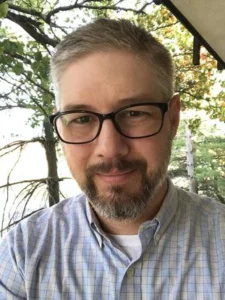 I started my mental health journey when I was hired at a Centerstone of Illinois clinic as a residential support specialist in a group home setting. This felt like the perfect opportunity for me — I’d always been interested in helping people. Little did I know that years later I would be the one who would need that support and help.
I started my mental health journey when I was hired at a Centerstone of Illinois clinic as a residential support specialist in a group home setting. This felt like the perfect opportunity for me — I’d always been interested in helping people. Little did I know that years later I would be the one who would need that support and help.
About a year after joining, the facility received a new grant and asked me to step into a leadership role to supervise a team of certified peer specialists. The opportunity to become more engaged in the field was exciting, especially because I’d already been involved with several community support groups and working as a case manager in my community.
The role opened my eyes! I was exposed to the concept of person-first language for the first time, and my team kindly offered alternative language when discussing mental health challenges and illnesses. I was offered a lot of guidance for which I was so thankful!
Working with certified peer specialists was one of the most rewarding experiences of my career. I witnessed connections people were making with others on a daily basis. These people actually understood their life experiences and challenges and were willing to talk about them. Even people who were reluctant to speak to our most-seasoned clinicians were opening up to one another. I regularly got to see connections, compassion and recovery in action.
Years later, I struggled with my own significant mental health challenges. I found myself in a really dark place. My family life was crumbling around me. I unsuccessfully tried to self-manage my issues. Stubbornly, I resisted the idea of seeking help to talk about the “monster” that followed me. I thought with all my training and knowledge, surely, I could manage this myself. I didn’t need help. I didn’t need to talk about it. I would figure it out.
I didn’t figure it out. It was getting worse. I was drowning.
My physical health was deteriorating as a result. I was losing sleep. I was drinking heavily and was in significant physical pain. Suicide was a regular thought. Although I never thought I would act on it, I found myself driving by places and thinking, “This would be a beautiful place to die.” I lived like this for a few years — until I ultimately lost my job.
Feeling at the lowest point of my life, I was scrolling through my social media one day and saw a close friend of mine had shared a personal story. That is what I needed. To this day, that person still doesn’t know how much of an impact their story made in my life, but I made a decision that day.
I called my primary care physician (PCP) and shared what I was going through. I started utilizing my support systems more effectively and sharing my feelings more often. I made myself vulnerable and confessed on social media that I wasn’t doing well.
What happened next surprised me. My social media was flooded with private messages of support, encouragement and shared experiences. People I hadn’t talked to in years were messaging me to give reassurance and tell me about their own challenges. They let me know I wasn’t alone. It touched me so deeply and reminded me of those interactions I used to see on a daily basis, but this time I was the one being supported.
Things are great now. I worked with my PCP and my therapist to battle that beast. I just celebrated six years of sobriety.
In 2016, I trained to be a Mental Health First Aid Instructor, and I love everything about working with the program. I remember sitting in my first Instructor course thinking how I couldn’t wait to get out and start spreading this message of hope and recovery to others.
I now teach Adult, Youth and teen Mental Health First Aid on a regular basis. I know I carry a responsibility to help others learn how to save lives. Each year on my birthday, I make sure I have a course scheduled. I celebrate life by training others how to give the people in their lives more birthdays.
I still have dark days, and I still pass by some of those beautiful places. But now when I drive by, I think, “This is a beautiful place to live.”
Interested in starting or continuing your mental health journey? Get certified to become a First Aider and Instructor and #BeThe1in15 in your community.